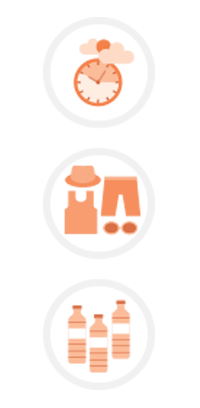Beat the Heat: How to Prevent, Recognize, and Manage Heat-Related Illnesses
2016-07-14
With summer in full swing, many of us are making the most of the beautiful weather. However, when spending more time outdoors, it's important to be aware of heat-related illnesses, especially during periods of high temperatures or "heat waves". These are the times when heat-related illnesses such as heat exhaustion can occur.
Some medicines can increase the risk of a heat-related illness. If you take medicine to treat allergies, high blood pressure, Parkinson's disease, and some mental illnesses, you may have a higher risk for a heat-related illness. You should continue your medicines for these health conditions, however, and also know ways to avoid heat-related illnesses.
Know whether you are at risk, and make a plan to beat the heat
Your body has ways to keep itself cool during hot weather or exercise, but certain health conditions and medicines can prevent this cooling from happening. Lack of normal cooling can put you at higher risk of a heat-related illness. If left untreated, these illnesses can lead to heat stroke, which is a medical emergency.
|
Signs of Heat-Related Illnesses
|
|
Heat Exhaustion
-
Weakness
-
Dizziness
-
Headache
-
Nausea
-
Vomiting
-
Sweating
-
Rapid heartbeat
|
Heat Stroke
Similar to heat exhaustion, but also:
-
Red, hot, dry skin (in those who are inactive)
-
Confusion
-
Rapid breathing
-
High body temperature
-
Unconsciousness
|
So who else is at risk of a heat-related illness? Age can be a factor, with young children and elderly people being at greater risk of heat stroke. In addition, certain health conditions, such as heart, kidney, or lung disease, can also put you at risk. People who work or train outside, such as construction workers, firefighters, and athletes, all face an increased risk.
SafeMedicationUse.ca has the following advice for consumers to help reduce the risk of harm from a heat-related illness:
-

- Ask your doctor and pharmacist whether your medicines or health conditions could put you at risk of a heat-related illness. If you know about the risk, you can be prepared.
- Be aware of heat wave warnings in your area. Check the weather regularly on your local television stations, or consult a weather service like Environment Canada.
- If you know you are at risk of a heat-related illness, ask a neighbour, friend, or family member to check in on you during a heat wave.
- Avoid outdoor activity when the sun is hottest, between 10:00 am and 3:00 pm. If you are active outdoors, take lots of breaks.
- Stay in an air-conditioned building or a shaded area whenever possible.
- Wear loose-fitting, light-coloured clothing and a wide-brimmed hat to protect yourself from sun and heat.
- Drink plenty of fluids, especially before, during, and after any outdoor activity.
- Know the warning signs of heat-related illnesses, and know what action to take if the warning signs occur.
What to do if you don't feel well during a heat wave
- If you have symptoms of heat stroke, call 9-1-1.
- Stop any activity and rest in an air-conditioned building or shaded area, if possible.
- Drink plenty of fluids such as water or sports drinks (dehydration increases the risk of heat stroke).
- Remove any clothing you do not need.
- Apply cool water or ice packs to the skin to lower your body temperature.
Read Health Canada's information tips on how to keep yourself and your loved ones safe during a heat wave.
|
Tips for Practitioners
-
Identify patients in your practice who may be at risk of heat-related illnesses. Inform these individuals of their risk, and share the information in this bulletin with them.
|
Medication safety bulletins contribute to Global Patient Safety Alerts
|

